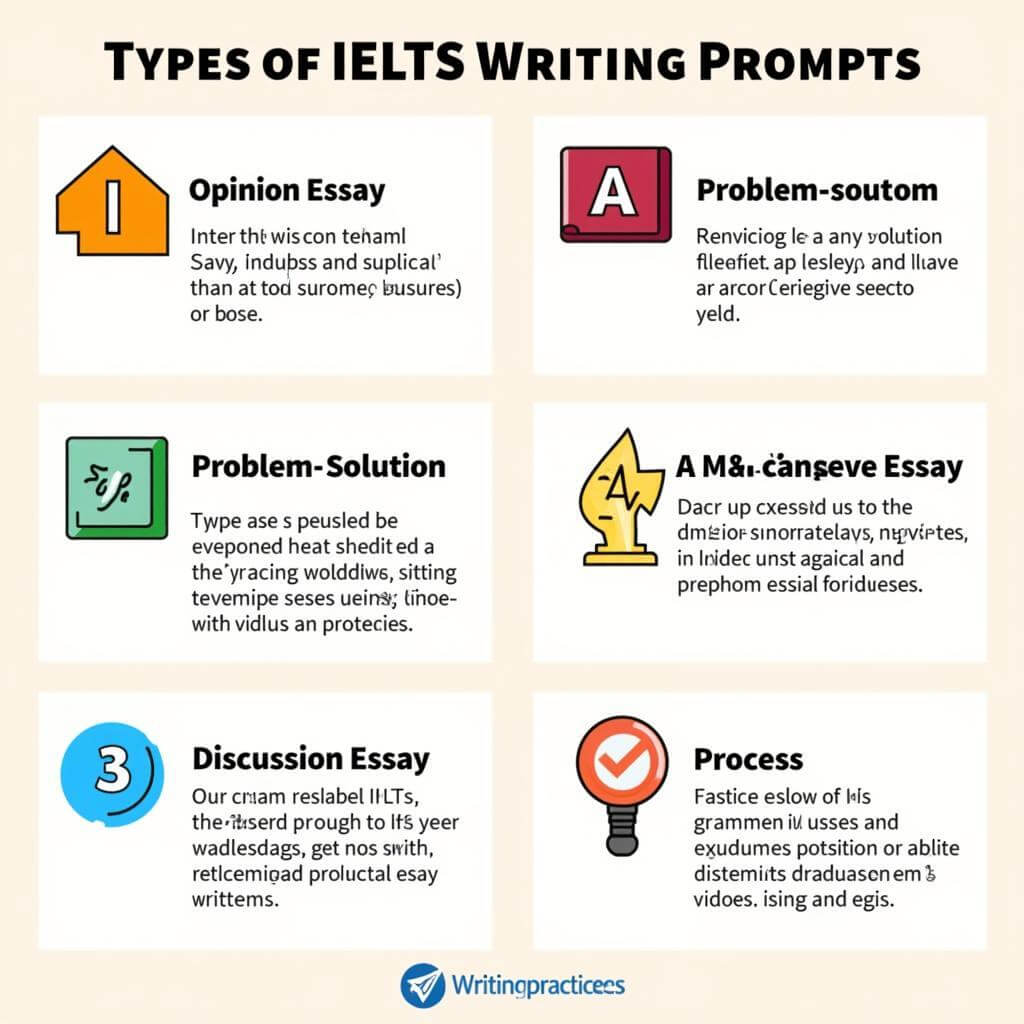Practicing grammar through writing prompts is an effective strategy for IELTS preparation. This approach not only enhances your grammatical accuracy but also improves your overall writing skills. Let’s explore how you can leverage writing prompts to boost your IELTS performance.
Understanding the Importance of Grammar in IELTS Writing
Grammar plays a crucial role in the IELTS writing section. It accounts for 25% of your overall writing score, making it a critical component to master. What are the common IELTS writing prompts? Understanding these prompts can help you focus your grammar practice effectively.
The Impact of Grammar on IELTS Scores
Proper grammar usage demonstrates your ability to communicate clearly and effectively in English. It shows the examiner that you have a good command of the language, which is essential for achieving a high band score.
Selecting Appropriate Writing Prompts for Grammar Practice
Choosing the right writing prompts is crucial for effective grammar practice. Here are some tips to help you select prompts that will enhance your grammatical skills:
- Focus on diverse topics to expand your vocabulary
- Choose prompts that require different grammatical structures
- Select prompts that align with common IELTS themes
Types of Writing Prompts for Grammar Practice
- Opinion essays
- Problem-solution essays
- Advantage-disadvantage essays
- Discussion essays
- Process descriptions

Strategies for Practicing Grammar with Writing Prompts
To make the most of your grammar practice using writing prompts, consider the following strategies:
1. Identify Target Grammar Structures
Before you start writing, identify specific grammar structures you want to practice. This could include:
- Conditional sentences
- Passive voice
- Relative clauses
- Perfect tenses
- Modal verbs
2. Incorporate Varied Sentence Structures
Challenge yourself to use a mix of simple, compound, and complex sentences. This variety will showcase your grammatical range and improve your writing style.
3. Focus on Tense Consistency
Pay attention to maintaining consistent tenses throughout your essay. Not until then did I understand the importance of tense consistency in IELTS writing.
4. Use Connectives and Transition Words
Incorporate appropriate connectives and transition words to improve the flow of your writing and demonstrate your ability to link ideas coherently.
5. Self-Edit for Grammar Mistakes
After completing your response to a writing prompt, take time to review and edit your work, focusing specifically on grammar errors.
Common Grammar Mistakes to Avoid in IELTS Writing
Being aware of common grammar mistakes can help you avoid them in your IELTS writing. Here are some frequent errors to watch out for:
- Subject-verb agreement errors
- Incorrect use of articles (a, an, the)
- Misuse of prepositions
- Confusing similar words (e.g., affect/effect, their/there/they’re)
- Run-on sentences or sentence fragments
What are the common IELTS writing task 2 mistakes? Understanding these mistakes can help you improve your grammatical accuracy.
Timed Practice: Simulating IELTS Conditions
To truly prepare for the IELTS exam, it’s essential to practice under timed conditions. What is the IELTS writing task 2 duration for academic? Knowing this will help you manage your time effectively during practice sessions.
Tips for Timed Grammar Practice:
- Set a timer for the appropriate duration
- Practice quick outlining to organize your thoughts
- Leave time for proofreading and editing
- Focus on accuracy while maintaining a good writing speed
Feedback and Improvement
Getting feedback on your grammar usage is crucial for improvement. Consider these methods:
- Use online grammar checkers as a first step
- Join IELTS study groups for peer review
- Work with an IELTS tutor for professional feedback
- Keep a grammar error log to track your progress
“Regular practice with writing prompts, combined with targeted feedback, can significantly improve your grammatical accuracy and overall IELTS writing performance,” says Sarah Thompson, IELTS expert with 15 years of teaching experience.
Advanced Grammar Techniques for Higher Band Scores
To aim for higher band scores, consider incorporating these advanced grammar techniques into your writing:
- Use of inversion for emphasis
- Accurate use of participle clauses
- Incorporation of cleft sentences
- Proper use of subjunctive mood
- Mastery of reported speech
How to improve IELTS writing band score? Implementing these advanced techniques can help you achieve your desired score.
Conclusion
Practicing grammar with writing prompts is an invaluable method for improving your IELTS writing skills. By focusing on diverse prompts, targeting specific grammar structures, and simulating exam conditions, you can significantly enhance your grammatical accuracy and overall writing performance. Remember, consistent practice and reflective learning are key to mastering grammar for IELTS success.
FAQs About Practicing Grammar with Writing Prompts for IELTS
-
How often should I practice grammar using writing prompts?
Aim to practice at least 3-4 times a week, spending about 40-60 minutes per session. -
Can I use the same writing prompt multiple times for grammar practice?
Yes, revisiting prompts can be beneficial. It allows you to focus on different grammatical aspects each time. -
How can I track my grammar improvement over time?
Keep a log of your common mistakes and review it regularly to see which areas have improved and which need more focus. -
Are there specific grammar points that are more important for IELTS?
While all grammar is important, focus on tenses, conditionals, and complex sentence structures as they are frequently used in IELTS tasks. -
Should I memorize grammar rules for IELTS?
Instead of memorizing, focus on understanding and applying grammar rules through regular practice with writing prompts. -
How can I make grammar practice more engaging?
Try incorporating grammar games, using real-life topics for prompts, or practicing with a study partner to make it more interesting. -
Is it better to practice grammar in isolation or within full essays?
Both approaches have benefits. Practice specific grammar points in isolation, but also apply them in full essays to understand their use in context.